- Home
- Jojo Moyes
After You Page 8
After You Read online
Page 8
“And can I stay tonight?”
“I need to talk to your mum, Lily.”
“What for?”
“I need to know a little bit more about what’s actually going on here.”
She stood in the doorway. “So you don’t believe me.”
I gestured to her to turn around, so I could finish putting on my bra. “I do believe you. But that’s the deal. You want something from me, I need to know a bit more about you first.”
Just as I pulled my T-shirt over my head, she turned back again. “Suit yourself. I need to pick up some more clothes anyway.”
“Why? Where have you been staying?”
She walked away from me, as if she hadn’t heard, lifting an arm to sniff her armpit. “Can I use your shower? I absolutely reek.”
• • •
An hour later, we drove to St. John’s Wood. I was exhausted, both by the night’s events and the strange energy Lily gave off beside me. She fidgeted constantly, smoked endless cigarettes, then sat in a silence so loaded I could almost feel the weight of her thoughts.
“So . . . who was he? That guy last night?” I kept my face to the front, my voice neutral.
“Just someone.”
“You told me he was your boyfriend.”
“Then that’s who he was.” Her voice had hardened, her face closed.
As we drew nearer to her parents’ house, she crossed her arms in front of her, bringing her knees up to her chin, her gaze set and defiant, as if already in silent battle. I had wondered if she had been telling me the truth about St. John’s Wood, but she gestured to a wide, tree-lined street, and told me to take the third left, and we were suddenly in the kind of road that diplomats or expat American bankers live in, the kind of road that nobody ever seems to go in or out of. I pulled the car up, gazing out of the window at the tall white stucco buildings, the carefully trimmed yew hedging, and immaculate window boxes.
“You live here?”
She slammed the passenger door behind her so hard that my little car rattled. “I don’t live here. They live here.”
• • •
She let herself in and I followed, awkwardly, feeling like an intruder. We were in a spacious, high-ceilinged hallway, with parquet flooring and a huge gilt mirror on the wall, on which a slew of white invitation cards jostled for space in its frame. A vase of beautifully arranged flowers sat on a small antique table. The air was scented with their perfume.
From upstairs came the sound of some kind of commotion, possibly children’s voices; it was hard to tell.
“My half brothers,” Lily said dismissively, and walked through to the kitchen, apparently expecting me to follow. I stood and stared; it was an enormous kitchen in modernist gray, with an endless mushroom-colored polished-concrete worktop. Everything in it screamed money, from the Dualit toaster to the coffeemaker that was large and complicated enough not to be out of place in a Milanese café. Lily opened the fridge and scanned it, finally pulling out a container of fresh pineapple pieces that she started to eat with her fingers.
“Lily?”
A voice from upstairs, urgent, female.
“Lily, is that you?” The sound of footsteps racing downstairs.
Lily rolled her eyes.
A blond woman appeared in the kitchen doorway. She stared at me, then at Lily, who was dropping a piece of pineapple languidly into her mouth. She walked over and snatched the container from her hands. “Where the hell have you been? The school is beside themselves. Daddy was out driving around the neighborhood. We thought you’d been murdered! Where were you?”
“He’s not my dad.”
“Don’t get smart with me, young lady. You can’t just walk back in here like nothing’s happened! Do you have any idea of the trouble you’ve caused? I was up with your brother half the night, and then I couldn’t sleep for worrying about what had happened to you. I’ve had to cancel our trip to Granny Houghton’s because we didn’t know where you were.”
Lily stared at her coolly. “I don’t know why you bothered. You don’t usually care where I am.”
The woman stiffened with rage. She was thin, the kind of thin that comes with fad diets or compulsive exercise; her hair was expensively cut and colored so that it looked neither, and she was wearing what I assumed were designer jeans. But her face, tanned as it was, betrayed her; she looked exhausted. She spun around to look at me. “Is it you she’s been staying with?”
“Well, yes, but—”
She looked me up and down and apparently decided she was not enamored of what she saw. “Do you know the trouble you’re causing? Do you have any idea how old she is? What the hell do you want with a girl that young anyway? You must be, what, thirty?”
“Actually, I—”
“Is this what it’s about?” she asked her daughter. “Are you having a relationship with this woman?”
“Oh, Mum, shut up.” Lily had picked up the pineapple again and was fishing around in it with her forefinger. “It’s not what you think. She hasn’t caused any of it.” She lowered the last piece of pineapple into her mouth, pausing to chew, perhaps for dramatic effect, before she spoke again. “She’s the woman who used to look after my dad. My real dad.”
• • •
Tanya Houghton-Miller sat back in the endless cushions of her cream-colored sofa and stirred her coffee. I perched on the edge of the sofa opposite, gazing at the oversized Diptyque candles and the artfully placed Interiors magazines. I was slightly afraid that if I sat back as she had, my coffee would tip into my lap.
“How did you meet my daughter?” she said wearily. Her wedding finger sported two of the biggest diamonds I’d ever seen.
“I didn’t, really. She turned up at my flat. I had no idea who she was.”
She digested that for a minute.
“And you used to look after Will Traynor.”
“Yes. Until he died.”
There was a brief pause as we both studied the ceiling—something had just crashed above our heads. “My sons.” She sighed. “They have some behavioral issues.”
“Are they from your . . . ?”
“They’re not Will’s, if that’s what you’re asking.”
We sat there in silence. Or as near to silence as it could get when you could hear furious screaming upstairs. There was another thud, followed by an ominous silence.
“Mrs. Houghton-Miller,” I said. “Is it true? Is Lily Will’s daughter?”
She raised her chin slightly. “Yes.”
I felt suddenly shaky and put my coffee cup on the table. “I don’t understand. I don’t understand how—”
“It’s quite simple. Will and I were together during the last year of uni. I was totally in love with him, of course. Everyone was. Although I should say it wasn’t all one-way traffic, you know?” She raised a small smile and waited, as if expecting me to say something. But I couldn’t. How could Will not have told me that he had a daughter? After everything we had been through?
Tanya drawled on. “Anyway. We were, you know, the golden couple of our group. Balls, punting, weekends away, you know the drill. Will and I—well, we were everywhere.” She told the story as if it were still fresh to her, as if it were something she had gone over and over in her head. “And then at our Founders’ Ball, I had to leave to help my friend Liza, who had got herself into a bit of a mess, and when I came back, Will was gone. No idea where he was. So I waited there for ages, and all the cars came and took everyone home, and finally a girl I didn’t even know very well came up to me and told me that Will had gone off with a girl called Stephanie Loudon. You won’t know her. But she’d had her eye on him forever. At first I didn’t believe it, but I drove to her house anyway, and sat outside, and sure enough, at 5 a.m. he came out and they stood there kissing on the doorstep like they couldn’t care who saw. And when I got out of the car and confronted him, he didn’t even have the grace to be ashamed. He just said there was no point in us getting emotional as we were never going to
last beyond college anyway.
“And then, of course, college finished, which was something of a relief, to be honest, because who wants to be the girl Will Traynor dumped? But it was so hard to get over, because it had ended so abruptly, you know? Then after we left and he started to work in the City I wrote to him asking if we could at least meet for a drink so I could work out what on earth had gone wrong. Because as far as I was concerned we had been really happy, you know? And he just got his secretary to send this—this card, saying she was very sorry but Will’s diary was absolutely full and he didn’t have time right now but he wished me all the best. ‘All the best.’” She grimaced.
I winced internally. Much as I wanted to discount her story, this version of Will held a horrible ring of truth. Will himself had looked back at his earlier life with utter clarity, had confessed how badly he had treated women when he was younger. (His exact words were, “I was a complete arse.”)
Tanya was still talking. “And then, about two months later, I discovered I was pregnant. And it was already awfully late because my periods had always been erratic and I hadn’t realized I’d already missed the first two. So I decided to go ahead and have Lily. But—” And here she lifted her chin again, as if braced to defend herself. “There was no point in telling him. Not after everything he’d said and done.”
My coffee had gone cold. “No point in telling him?”
“He’d as good as said he didn’t want anything to do with me. He would have acted as if I’d done it deliberately, to trap him or something.”
I think my mouth might have been hanging open. I made an effort to close it.
“But you—you don’t think he had the right to know, Mrs. Houghton-Miller? You don’t think he might have wanted to meet his child? Regardless of what had happened between the two of you?”
She put down her cup.
“She’s sixteen,” I said. “She would have been fourteen, fifteen when he died. That’s an awful long—”
“And by that time she had Francis. He was her father. And he has been very good to her. We were a family. Are a family.”
“I don’t understand—”
“Will didn’t deserve to know her.”
The words settled in the air between us.
“He was an arsehole, okay? Will Traynor was a selfish arsehole.” She pushed a strand of hair back from her face. “Obviously I didn’t know what had happened to him. That came as a complete shock. But I can’t honestly say it would have made a difference.”
It took me a moment to find my voice. “It would have made every difference. To him.”
She looked at me sharply.
“Will killed himself,” I said, and my voice cracked a little. “Will ended his life because he couldn’t see any reason to go on. If he’d known he had a daughter—”
She stood up. “Oh, no. You don’t pin that on me, Miss Whoever-you-are. I am not going to be made to feel responsible for that man’s suicide. You think my life isn’t complicated enough? Don’t you dare come here judging me. If you’d had to cope with half of what I cope with . . . No. Will Traynor was a horrible man.”
“Will Traynor was the finest man I ever knew.”
She let her gaze run up and down me. “Yes. Well, I can imagine that’s probably true.”
We stared at each other and I thought I had never been filled with such an instant dislike for someone. I had stood up to leave when a voice broke into the silence. “So my dad really didn’t know about me.”
Lily was standing very still in the doorway. Just for a moment, Tanya Houghton-Miller blanched. Then she recovered herself.
“I was saving you from hurt, Lily. I knew Will very well, and I was not prepared to put either of us through the humiliation of trying to persuade him to be part of a relationship he wouldn’t have wanted.” She smoothed her hair. “And you really must stop this awful eavesdropping habit. You’re likely to get quite the wrong end of the stick.”
I couldn’t listen to any more. I walked to the door as a boy began shouting upstairs. A plastic truck flew down the stairs and crashed into pieces somewhere below. An anxious face—Filipina?—gazed down at me over the banister. I began to walk down the front stairs.
“Where are you going?” Lily asked.
“I’m sorry, Lily. We’ll—perhaps we’ll talk some other time.”
“But you’ve hardly told me anything about my dad.”
“He wasn’t your father,” Tanya Houghton-Miller said. “Francis has done more for you since you were little than Will ever would have done—”
“Francis is not my DAD,” Lily roared.
Another crash from upstairs, and a woman’s voice, shouting in a language I didn’t understand. A toy machine-gun sent tinny blasts into the air. Tanya put her hands to her head. “I can’t cope with this. I simply can’t cope.”
Lily caught up with me at the door. “Can I stay with you?”
“What?”
“At your flat? I can’t stay here.”
“Lily, I don’t think—”
“Just for tonight. Please.”
“Oh, be my guest,” Tanya said. “Have her stay with you for a day or two. She’s just delightful company.” She waved a sarcastic hand. “Polite, helpful, loving. A dream to have around!” Her face hardened. “Let’s see how that works out. You know she drinks? And smokes in the house? And that she was suspended from school? She’s told you all this, has she?”
Lily seemed almost bored, as if she had heard this a million times before.
“She didn’t even bother turning up for her exams. We’ve done everything possible for her. Counselors, the best schools, private tutors. Francis has treated her as if she were his own. And she just throws it all back in our faces. My husband is having a very difficult time at the bank right now, and the boys have their issues, and she doesn’t give us an inch. She never has.”
“How would you even know? I’ve been with nannies half my life. When the boys were born, you sent me to boarding school.”
“I couldn’t cope with all of you! I did what I could!”
“You did what you wanted, which was to start your perfect family all over again, without me.” Lily turned back to me. “Please? Just for a bit? I promise I won’t get under your feet at all. I’ll be really helpful.”
I should have said no. I knew I should. But I was so angry with that woman. And just for a moment I felt as if I had to stand in for Will, to do the thing that he couldn’t do.
“Fine,” I said, as a large Lego creation whistled past my ear and smashed into tiny colored pieces by my feet. “Grab your things. I’ll be waiting outside.”
• • •
The rest of the day was a blur. We moved the boxes out of the spare room, stacking them in my bedroom, and made the room hers, or at least less of a storage area, putting up the blind I had never quite got around to fixing and moving in a lamp and my spare bedside table. I bought a camp bed, and we carried it up the stairs together, along with a hanging rail for her few things, and a new duvet and pillow cases. She seemed to like having a purpose, and was completely unfazed at the idea of moving in with somebody she hardly knew. I watched her arranging her few belongings in the spare room that evening and felt oddly sad. How unhappy did a girl have to be to want to leave all that luxury for a box room with a camp bed and a wobbly clothes rail?
I cooked pasta, conscious of the strangeness of having someone to cook for, and we watched television together. At half past eight her phone went off and she asked for a piece of paper and a pen. “Here,” she said, scribbling on it. “This is my mum’s mobile number. She wants your phone number and address. In case of emergencies.” I wondered fleetingly how often she thought Lily was going to stay.
At ten, exhausted, I told her I was turning in. She was still watching television, sitting cross-legged on the sofa and messaging someone on her little laptop. “Don’t stay up too late, okay?” It sounded fake on my lips, like someone pretending to be an adult.
/> Her eyes were still glued to the television.
“Lily?”
She looked up, as if she’d only just noticed I was in the room. “Oh, yeah, I meant to tell you. I was there.”
“Where?”
“On the roof. When you fell. It was me who called the ambulance.”
I saw her face suddenly, those big eyes, that face, pale in the darkness. “But . . . but what were you doing up there?”
“I found your address. After everyone at home had gone nutso, I just wanted to work out who you were before I tried to talk to you. I saw I could get up there by the fire escape and I saw your light was on. I was just waiting, really. But when you came up and started messing about on the edge I suddenly thought if I said anything I’d freak you out.”
“Which you did.”
“Yeah. I didn’t mean to do that. I actually thought I’d killed you.” She laughed, nervously.
We sat there for a minute.
“Everyone thinks I tried to jump.”
Her face swiveled toward me. “Really?”
“Yeah.”
She thought about this. “Because of what happened to my dad?”
“Yes.”
“Do you miss him?”
“Every single day.”
She was silent. Eventually she said, “So when is your next day off?”
“Sunday. Why?” I said, dragging my thoughts back.
“Can we go to your home town?”
“You want to go to Stortfold?”
“I want to see where he lived.”
8
I didn’t tell Dad we were coming. I wasn’t entirely sure how to have that conversation. We pulled up outside our house and I sat for a minute, conscious, as she peered out of the window, of the small, rather weary appearance of my parents’ house in comparison with her own. She had suggested we bring flowers when I told her my mother would insist we stay for lunch, and got cross when I suggested petrol station carnations, even though they were for someone she’d never met.
I had driven to the supermarket on the other side of Stortfold, where she had chosen a huge hand-tied bouquet of freesias, peonies, and ranunculus. Which I had paid for.
“Stay here a minute,” I said, as she started to climb out. “I’m going to explain before you come in.”
“But—”
“Trust me,” I said. “They’re going to need a minute.”
I walked up the little garden path and knocked on the door. I could hear the television in the living room, and pictured Granddad there, watching the racing, his mouth working silently along with the horses’ legs. The sights and sounds of home. I thought of the months I had kept away, no longer sure I was even welcome, of how I had refused to allow myself to think of how it felt to walk up this path, to smell the fabric-conditioned scent of my mother’s embrace, to hear my father’s distant bellow of laughter.
Dad opened the door, and his eyebrows shot up. “Lou! We weren’t expecting you! . . . Were we expecting you?” He stepped forward and enveloped me in a big hug. I realized I liked having my family back again.
“Hi, Dad.”
He waited on the step, arm outstretched. The smell of roast chicken wafted down the corridor. “You coming in, then, or are we going to have a picnic out on the front step?”
“I need to tell you something first.”
“You lost your job.”
“No, I did not lose my—”
“You got another tattoo.”
I stared at him. “You knew about the tattoo?”

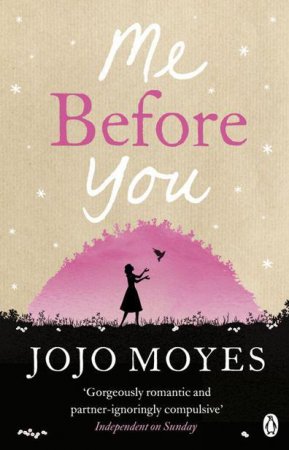 Me Before You
Me Before You After You
After You The Last Letter From Your Lover
The Last Letter From Your Lover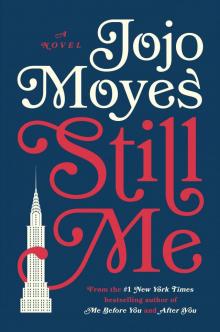 Still Me
Still Me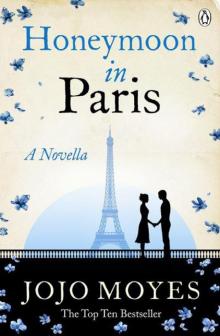 Honeymoon in Paris
Honeymoon in Paris Night Music
Night Music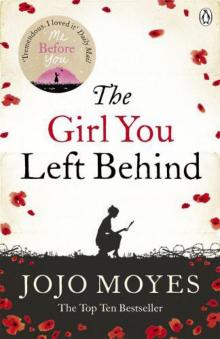 The Girl You Left Behind
The Girl You Left Behind Windfallen
Windfallen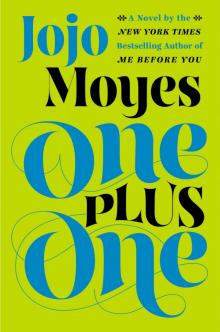 One Plus One
One Plus One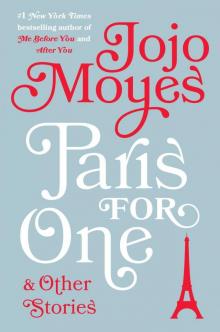 Paris for One and Other Stories
Paris for One and Other Stories The Giver of Stars
The Giver of Stars The Ship of Brides
The Ship of Brides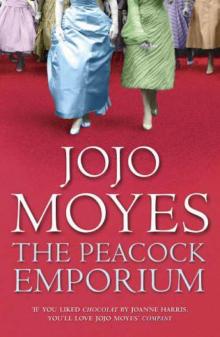 The Peacock Emporium
The Peacock Emporium Silver Bay
Silver Bay The Horse Dancer
The Horse Dancer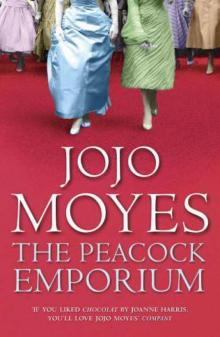 Peacock Emporium
Peacock Emporium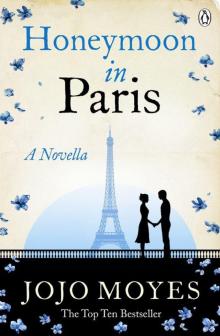 Honeymoon in Paris: A Novella
Honeymoon in Paris: A Novella Ship of Brides
Ship of Brides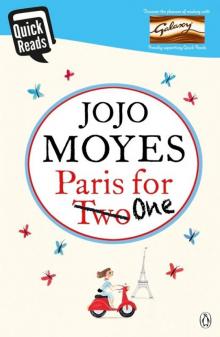 Paris For One (Quick Reads)
Paris For One (Quick Reads)